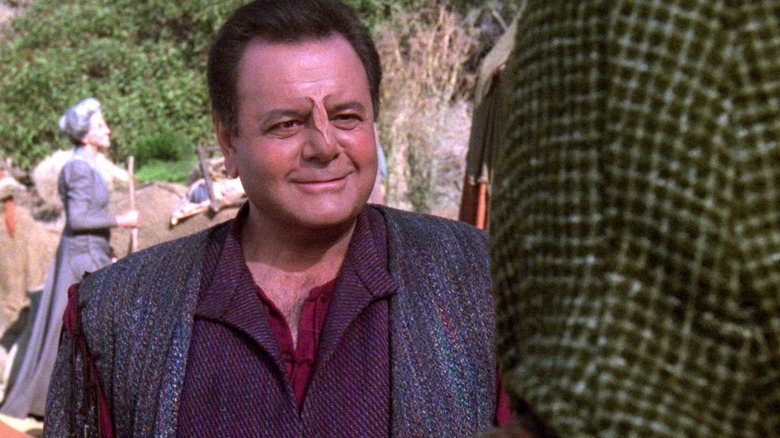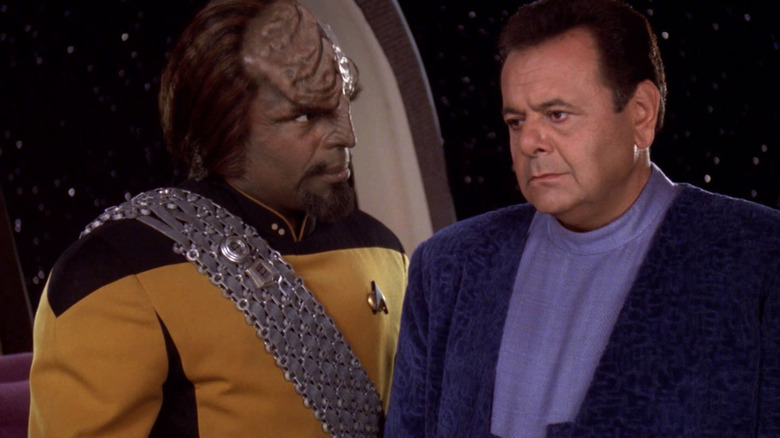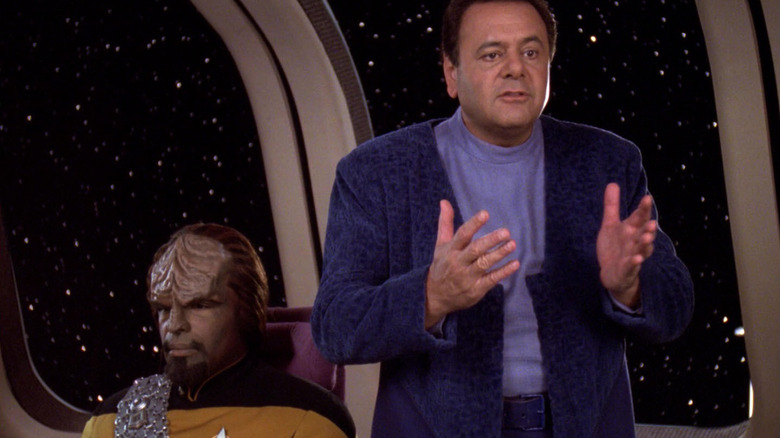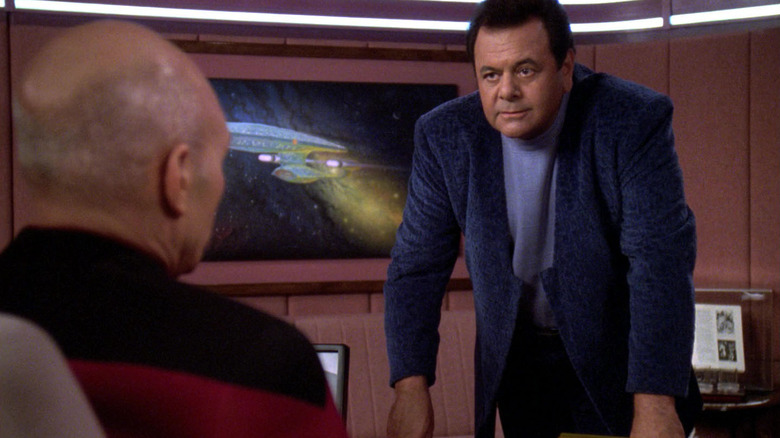Remembering Paul Sorvino's Guest Role On Star Trek: The Next Generation
Actor Paul Sorvino passed away at the age of 83 on July 25, 2022. His outsize personality and "tough guy" features saw him playing many characters with nicknames in quotation marks: "Hips" in "The Gambler," "Big Joe" in "Angel and Big Joe," "Chubby" De Coco in "Bloodbrothers," "Jazz" Maffie in "The Brinks Job," "Lips" Manliss in "Dick Tracy." He played a "Fat Tony" and a "Big Mike." He's the type of actor that would inspire many a casting agent to bang on their desk and scream "get me a Paul Sorvino type!" He was an institution unto himself. His final roles were playing real-life gangster Frank Costello in "Godfather of Harlem," with his final film role coming in the 2021 crime film "The Birthday Cake."
Sorvino may seen like an odd choice to appear in the mannered, staid world of "Star Trek: The Next Generation" — at least outside of a holodeck — but Sorvino did indeed play a character named Dr. Nikolai Rozhenko on the episode "Homeward," which aired on January 17, 1994 during the show's final season. To put Dr. Rozhenko into context, the character of Worf (Michael Dorn) is a Klingon whose parents were killed by Romulans when he was a boy. Worf was raised on Earth by the Rozhenko family, who had previously appeared on "Next Generation" in the episode "Family." The Rozhenkos were played by George Brown and Theodore Bikel.
But Nikolai wasn't mentioned until "Homeward." As one might imagine, the two siblings have something of an antagonistic relationship. Dorn and Sorvino wonderfully tore up scenery as the bickering brothers.
'Homeward'
The plot of "Homeward" is a classic Prime Directive plot. The Enterprise is called to the planet Boraal II by Dr. Rozhenko to aid in the protection of the natives from an upcoming planet-wide climate disaster. But the Boraalans are still in the agrarian stage of their development, meaning that the Federation cannot interfere with their development. Thanks to some cosmetic surgery, Dr. Rozhenko has been living among the Boraalans for years, pretending to be one of them and falling in love with a Boraalan woman. Worf greets him on the planet's surface, also having been altered, to discuss the feasibility and the ethics of a rescue attempt. When the Enterprise refuses to shield the natives from the climate disaster, Dr. Rozhenko takes it upon himself to transport his tribe onto the Enterprise's holodeck, made to look like caverns under the surface of the Boraalan homeworld. Dr. Rozhenko insists that Captain Picard (Patrick Stewart) find he and his tribe a new home, as he was unwilling to let them die out.
The benevolence of Dr. Rozhenko's plan is immediately evident, but the consequences are felt later. One of the Bolaarans finds his way out of the holodeck and wandering the corridors of a high-tech spacecraft he doesn't understand. He will eventually be driven slightly mad by the experience, and will take his own life. When the holodeck program threatens to break down, and glitches are seen in the fake cave walls, Worf and Dr. Rozhenko have to find creative ways to cover for them.
The two brothers' increasing animosity certainly doesn't help, either.
Dr. Rozhenko's morality
Dr. Rozhenko is an interesting character for Trek, making the casting of Sorvino appropriate. If one finds themselves abiding by the sternly moral dictates of the Prime Directive, one may find multiple tricky moral dilemmas. The Prime Directive – that of noninterference — is an anti-colonialist measure meant to ensure that the Federation, with their superior technology, never uses their tools to dictate their own moral stance onto others. In stopping another planets' war, the Federation would be robbing said planet of their ability to find peace on their own. Every planet, "Star Trek" argues, has to grow at its own pace and come to its own conclusions. Imposing their will on others — however moral it may look to a modern human TV audience — would ostensibly make the Federation into conquerors.
When it comes to a case like in "Homeward," however, Dr. Rozhenko cannot be convinced of any argument that would allow the Boraalans to die. The counterargument can only go to long-term abstractions and limp hypotheticals. If the Boraalans survive, perhaps their biology would unleash a horrendous virus on another planet. Or wipe out that planet's native evolutionary process. Dr. Rozhenko can't understand why the wellbeing of one planet's evolving fauna should take precedent over actual people he has the capacity to save. For him, the Prime Directive couldn't possibly be moral if it allows for the neglect and death of an entire species.
Sorvino and Picard
Sorvino, being the kind of natural, tough actor that he is, brings an important "outsider" energy to "Star Trek." He is no diplomat or stuffy admiral. He's a human being who cares. Is he engaging in deception? Yes. Does he take reckless action? Yes. But we understand his every decision and are invited to relate to his choices.
"Star Trek" has a long reputation of moral debates, and none are so heated as the morality of the Prime Directive. It's a moral imperative that stands opposite the credo of Spider-Man. The latter argues that if one has great power, one is ethically bound to use that power for good. If one has the power to act and doesn't, they are tacitly approving of the evil being perpetuated. The former believes in organic moral growth, understanding that, in the broad scope of civilization, morality must grow from mistakes. The Prime Directive doesn't approve of war or immoral behavior, but it also understands that another person's will is not the same as learning a lesson yourself.
Sorvino is Spider-Man in this scenario. Sorvino, rough hewn, doesn't care about the long arm of development. He cares about the moral imperative ... to care. Not many actors have the presence to get up in the face of Captain Picard, but darn it if Sorvino isn't one of them. You ain't helping? Fine. I am. At the end of the day, Sorvino kind of wins the argument. The actual ethics will need to be debated another time.
R.I.P. Paul Sorvino. Thanks for giving hell to a starship captain.



